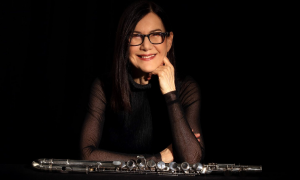Home » Jazz Articles » Interview » Ron Korb: Pan-Global Flutist
Ron Korb: Pan-Global Flutist

Ron Korb
fluteAll About Jazz: Who were and are some of your influences, both as a flutist and in a broader sense??
Ron Korb: My first love was jazz. As a teenager that is what I collected. That is what got me into the flute, by listening to jazz flute players like

Hubert Laws
woodwindsb.1939

Moe Koffman
flute1928 - 2001

Jane Bunnett
saxophone, sopranob.1955
AAJ: Were there any other memorable jazz artists you saw back then??
RK: Back then I was obsessed with jazz and visual art. I was a strange kid in that sense as all my school mates were into rock, and I was collecting jazz records and going to jazz festivals and clubs. At the time Toronto's Ontario Place had daily concerts in the summer and featured a lot of legendary artists. It had a great outdoor amphitheatre with a revolving stage where I saw some amazing shows by

Ella Fitzgerald
vocals1917 - 1996

Stan Kenton
piano1911 - 1979

Woody Herman
band / ensemble / orchestra1913 - 1987

Buddy Rich
drums1917 - 1987

Sonny Rollins
saxophoneb.1930

Herbie Mann
flute1930 - 2003

Pat Metheny
guitarb.1954

Maynard Ferguson
trumpet1928 - 2006

George Benson
guitarb.1943

Larry Coryell
guitar1943 - 2017
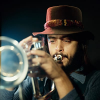
Chuck Mangione
flugelhorn1940 - 2025

Art Blakey
drums1919 - 1990

Dave Brubeck
piano1920 - 2012

Wayne Shorter
saxophone1933 - 2023

Wynton Marsalis
trumpetb.1961

Miles Davis
trumpet1926 - 1991

McCoy Tyner
piano1938 - 2020

Chick Corea
piano1941 - 2021

Art Pepper
saxophone, alto1925 - 1982
AAJ: Let's talk some about World CafЁҰ, the album you've just put out.
RK: World CafЁҰ is a project I have wanted to do for many years. The album features the western flute but there are tracks that feature the Japanese ocarina and bamboo flute and bass flute. We had some productive rehearsals with the musicians which made the recording sessions very fruitful. It is really a pleasure when all the technical and musical challenges have been ironed out and you can just focus on capturing the magic. The album was recorded at Kuhl Musik in Toronto with as many of the musicians playing live off the floor as possible. Gary Honess, the engineer, worked on my last two projects where we did quite a bit of experimentation to get the best sound. I feel on World CafЁҰ all that previous work has really paid off. The core band are friends I have played with for decades:

Bill Evans
piano1929 - 1980
Steve Lucas
bass
Hilario Duran
pianoRoberto Riveron
bassAAJ: The song titles on World CafЁҰ hop around geographically. Have you been to all the places named?
RK: Yes, I have been to all the places that are named specifically like Cuba, New Orleans, Argentina, Cordoba, Spain and in general the Mediterranean countries and the Caribbean.?
AAJ: What's your favorite place that you've been in Latin America?
RK: I think they are all great places to visit and the people are wonderful. If you think about it, South America is like the mirror image of North America.? Chile has beautiful rocky mountains like British Columbia, and Argentina being far south of the equator is somewhat similar to Canada with four distinct seasons. I like Buenos Aires not just because of its old world charm but because of the cultural diversity similar to Toronto.
AAJ: In a sense your whole recording career could be termed a "world cafЁҰ," with all the places and geographical inspirations that have run through your music. World CafЁҰ is a far remove musically from the Asian-influenced recordings you've done the last few years. What made you decide to go in a more tropical Latin/Caribbean direction with this one?? Is this the first time you've really delved into those sounds?
RK: World CafЁҰ is far removed from the Asia Beauty album but not from all my previous work. In 1995 on my album Behind the Mask I had a Latin tune called "Dark Eyes" and a Calypso piece called "Shadow Puppets." Also, on my Ron Korb Live DVD/CD, I had "Casco Viejo" and "La Sirena." I have always wanted to make an album like this and I feel like my wish has finally come true.
AAJ: The song "Island Life" on World CafЁҰ has an unusual flute sound. What kind of flute are using?
RK: I am playing a Japanese Ocarina made from the high-quality mud of Nagoya. It is the same kind of instrument as the famous Japanese Ocarina player Sojiro uses on his recordings. In some of the sections I doubled it with the bass flute which gives it a sound similar to African flute.
AAJ: Your career, in a sense, is reminiscent of flutist

Herbie Mann
flute1930 - 2003
RK: It is interesting you mention him because my favourite Herbie Mann album, Big Boss Mann, was the first time I heard flute used in a Latin jazz context. It is a big band with an Afro Cuban percussion section with

Chick Corea
piano1941 - 2021

Dizzy Gillespie
trumpet1917 - 1993

Nat Adderley
trumpet1931 - 2000

Horace Silver
piano1928 - 2014
AAJ: Who are some of your other jazz influences, flute and non-flute, and how have they influenced your playing?
RK:In terms of flute, I also listened to

James Moody
woodwinds1925 - 2010

Eric Dolphy
woodwinds1928 - 1964

Anthony Braxton
woodwindsb.1945

Paul Horn
flute1930 - 2014

Lew Tabackin
saxophone, tenorb.1940

Yusef Lateef
woodwinds1920 - 2013

Dave Valentin
flute1952 - 2017

Sam Most
flute1930 - 2013

Charlie Parker
saxophone, alto1920 - 1955

John Coltrane
saxophone1926 - 1967

Lester Young
saxophone1909 - 1959

Paul Desmond
saxophone, alto1924 - 1977

Sidney Bechet
saxophone, soprano1897 - 1959
AAJ: What do you listen to in your spare time?
RK: That really changes all the time depending on my mood. Music is really the soundtrack of your life. I try to listen to every genre out there. For example, last year when I was in Alberta I was really enjoying listening to Alison Krauss and other country and bluegrass music. It just suited the environment perfectly. Sometimes I like discovering new sounds, so I spend my spare time listening to music from wildly diverse genres including World,?Dance,?Jazz, R&B, Folk, Classical, Alt Rock, Mariachi, all the way to Doom Metal.??
AAJ: What style/genre of music do you most enjoy playing??
RK: Throughout the years I have developed my own composing style which is a hybrid of various genres with world textures and western harmony. I have also cultivated a personal flute playing style which includes a lot of improv but not necessarily using jazz patterns and concepts primarily. At this point in my career playing my own compositions is what is most rewarding.
AAJ: You originally wanted to be a filmmaker. Has that interest steered you more toward soundtracks and TV than you may have done otherwise?
RK: In a certain way I have been swayed by my early filmmaking interests. I am always excited to do projects with film composers and producers. I would also say it influences the way I write music. Even though my music is instrumental,?the songs always have a topic and are telling a story. The song order is very important to me as well and I position each track of an album like a chapter of a book.? I like to make music that encourages the listener to create their own visual images while listening.
AAJ: You've guested on many musicians' albums and on stage, including with

Peter Gabriel
vocalsb.1950
RK: There are many who I would love to perform with but the one that comes to mind first is

Stevie Wonder
vocalsb.1950
AAJ: It's been noted that you have an extensive collection of over 250 flutes.? What are some of the highlight pieces of this collection?
RK: What comes to mind as being my most cherished instruments are Pie Pook and ox horn from Cambodia made by master musician Yim Saing. I also have a Chinese xiao and a Japanese shinobue gifted to me my master makers in Asia. As far as western music my two Albert Cooper head joints, particularly the beautifully engraved 14 karat solid gold one, are highlight pieces.?My Altus bass flute is also quite an important part of my collection.
AAJ: What project(s) are you working on currently or have planned?
RK: A favourite project of mine is designing wooden head joints for the Western concert flute with California flute maker Geoffrey Ellis. They are coincidentally called Ellis-Korb headjoints. Geoffrey is a highly skilled artisan using beautiful woods like curly maple to produce flutes of remarkable beauty.? We've received terrific feedback and are excited about going the next level this year. When I was in Japan last month the fabulous instrument store Yamano Music purchased some for their Ginza location and Weissman Music in New York City is also carrying them now. Of course, in this whole process we are trying to create the holy grail of mouthpieces, which for me is very strong motivation. What is brilliant about working with Geoffrey is that if we have an idea he can make it immediately which makes our experimentation very efficient and productive. ?
AAJ: Lastly, with all your trips to warmer climates, what makes you stay in Canada? It must be tempting to relocate when stuck in below zero January temperatures.
RK: Normally, I would say I don't really mind the cold weather. However, after the last winter I think relocating to a warm place might be a good idea. There may be a World Cafe 2 in the works earlier than you think!
Tags
Interviews
Ron Korb
Michael Ricci
Hubert Laws
Moe Koffman
Jane Bunnett
Ella Fitzgerald
Stan Kenton
Woody Herman
Buddy Rich
Sonny Rollins
VSOP
pat metheny
george benson
Larry Coryell
Chuck Mangione
The Boss Brass
Art Blakey
Dave Brubeck
Wayne Shorter
wynton marsalis
Miles Davis
McCoy Tyner
Chick Corea
Art Pepper
Bill Evans
Larry Crowe
Steve Lucas
Hilario Duran
Papiosco
Roberto Riveron
Johannes Linstead
Joseph Macerollo
Sojiro
Herbie Mann
Dizzy Gillespie
Nat Adderley
Horace Silver
James Moody
Eric Dolphy
anthony braxton
Paul Horn
lew tabackin
Yusef Lateef
Roland Kirk
Dave Valentin
Sam Most
Charlie Parker
John Coltrane
Lester Young
Paul Desmond
Sidney Bechet
Jean Pierre Rampal
Robert Aitken
James Galway
Alison Krauss
Peter Gabriel
Olivia Newton John
Stevie Wonder
Yim Saing
Maynard Ferguson
Comments
PREVIOUS / NEXT
Support All About Jazz
 All About Jazz has been a pillar of jazz since 1995, championing it as an art form and, more importantly, supporting the musicians who make it. Our enduring commitment has made "AAJ" one of the most culturally important websites of its kind, read by hundreds of thousands of fans, musicians and industry figures every month.
All About Jazz has been a pillar of jazz since 1995, championing it as an art form and, more importantly, supporting the musicians who make it. Our enduring commitment has made "AAJ" one of the most culturally important websites of its kind, read by hundreds of thousands of fans, musicians and industry figures every month.

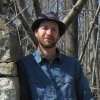
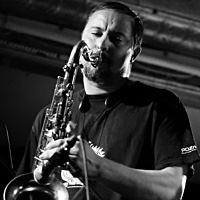
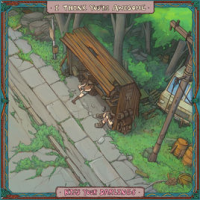

 Buy Now
Buy Now









